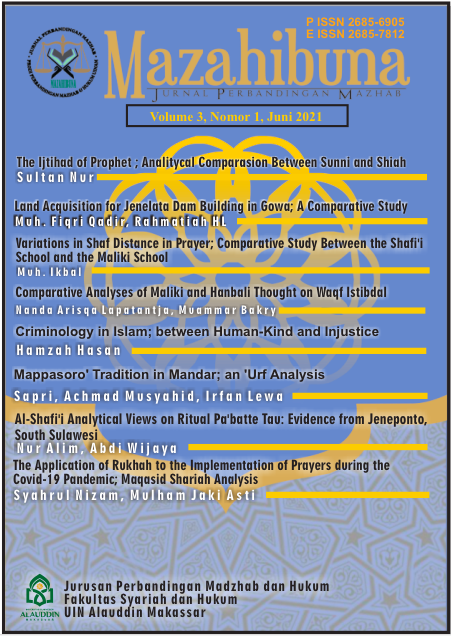Land Acquisition for Jenelata Dam Building in Gowa; A Comparative Study
Abstract
This article aims to uncover the views of Islamic law as a universal rule does not only discuss the relationship between humans and God but also the relationship between humans and other humans. The order of life in society as part of the interaction between humans creates various problems. Land becomes an object of economic driving for humans and the state whose users cannot be separated from politics and law, as well as having a function to create life together. The research method used is field research and is qualitative and comparative. Sources of data used in this study come from primary and secondary data. The result of this research is that the purpose of this land acquisition is for the public interest. In Islamic law, land acquisition for public purposes is included in one of the objectives of Islamic law (maqashid syariah). Islamic law teaches to help each other in terms of goodness, by having joint ownership of objects that have been held, the soul is calm because the needs have been provided. An object that is used as a public facility is a valuable asset so that the procurement process also uses a well-ordered system.References
Amiruddin, Muhammad Majdy, Nasrullah bin Sapa, and Abdul Syatar. “Uncovering Wasathiyah Values on Sharia Banking.” Al-Mashrafiyah: Jurnal Ekonomi, Keuangan, Dan Perbankan Syariah 4, no. 2 (2020): 15–28. doi:https://doi.org/10.24252/al-mashrafiyapp.v4i2.14676 UNCOVERING.
Azzan, Abdul Aziz Muhammad. Fiqih Muamalat Sistim Transaksi Dalam Fiqih Islam. Cet. I. Jakarta: Sinar Grafika Offset, 2010.
B. Lopa. Al-Qur’an dan Hak Asasi Manusia. Jakarta: PT. Dana Bhakti Prima Yasa.
Departemen Agama Republik Indonesia. Al-Qur’an Al-Karim dan Terjemahnya. Surabaya: Halim, 2013.
Effendi, Satria dan M. Zein. Ushul Fiqpp. Cet. III; Jakarta: Kencana, 2009Herry,
Ensiklopedia Hukum Islam 3 IMS-MAJ. Jakarta: Pt. Ichtiar Baru Van Hoeve, 1996.
Musleh Pengadaan Tanah Untuk Kepentingan Umum (Perspktif Al-Qur’an). Jurnal Ulul Albapp. Vol. 9 No. 2 (2008).
Iryani, Eva. Hukum Islam: Demokrasi dan Hak Asasi Manusia. Jurnal Ilmiah Universitas Batanghari Jambi. Vol. 17 no. 2 (2017).
Khudri. Risalah Rasulullapp. Jakarta: Penerbit: Bulan Bintang, 1989.
Limbong, Bernard. Politik Pertanahan. Jakarta: Margaretha Pustaka, 2014.
Makalah Seminar Pengadaan Tanah Bagi Pembangunan Untuk Kepentinga Umum, Program Pascasarjana Universitas Airlangga, Tanggal 27 September 2012.
Al-Mardhawi. Al-Inshaf Fi Ma’rifatir Rajih Minal Khilaf. Juz VII. Beirut: Maktab Ad-Dirasat Wal-Buhuts Fi Darrul Fikr, Ttpp.
Muhammad, Abdulkadir. Hukum dan Penelitian Hukum. Bandung: PT. Citra Aditya Bakti, 2004.
Muhammad, Ad-Dasuqi. Hasiyah Al-Dasuqiy Alasy Syahril Kabir. Juz III. Beirut: Maktab Ad-Dirasat Wal-Buhuts Fi Darrul Fikr,Tt.
Muhammad, Sulaiman Bin. Bujairini Alal Minhaj. Juz II. Beirut: Dar Al-Kitab Al-Arobi, Ttpp.Pasal 15 undang-undang nomor 2 tahun 2012
Pasal 14 ayat (2) undang-undang nomor 2 tahun 2012
Pasal 16-pasal 19 undang-undang nomor 2 tahun 2012
Pasal 28 undang-undang nomor 2 tahun 2012
Pasal 33 undang-undang nomor 2 tahun 2012
Pasal 37 undang-undang nomor 2 tahun 2012
Pasal 36 undang-undang nomor 2 tahun 2012
Pasal 45 undang-undang nomor 2 tahun 2012
Pasal 46 undang-undang nomor 2 tahun 2012
Pasal 48 undang-undang nomor 2 tahun 2012
Sarjita. Masalah Pelaksanaan Urusan Pertanahan Dalam Era Otonomi Daerah: Keppres No 34 Tahun 2003. Tugu Jogja: Yogyakarta, 2005.
Sitorus, Oloan. Pelepasan Atau Penyerahan Hak Atas Tanah Sebagai Cara Pengaddan Tanapp. Cet. I. Jakarta: Dasamedia 2006.
Slindeho, John. Masalah Tanah Dalam Pembangunan. Jakarta: Raja Grafindo Persada, 1987.
Soekanto, Soerjono. Pengantar Penelitian Hukum. Jakarta: Ui Press,1986
Subagyo, Joko. Metode Penelitian Dakam Teori dan Praktik. Jakarta: Rineka Cipta, 2011.
Surono, Agus. “Perlindungan Hak Korban Pengadaan Tanah Untuk Pembangunan Jalan Tol Di Kabupaten Kendal”. Jurnal Penelitia Hukum De Jure, Vol. 17 no. 4 (Desember 2017).
Sutedi, Adrian. Implementasi Prinsip Kepentingan Umum Dalam Pengadaan Tanah Untuk Pembangunan. Cet. II. Jakarta: Sinar Grafika, 2008.
Syariuddin, Amir. Ushul Fiqh 1. Cet. V; Jakarta: Kencana, 2011.
Yusuf, Abu. Al-Kharaj. Beirut: Darul Ma’rifat, T.th.

This work is licensed under a Creative Commons Attribution 4.0 International License.
Authors who publish with Mazahibuna: Jurnal Perbandingan Mazhab agree to the following terms:
- Authors retain copyright and grant the Mazahibuna: Jurnal Perbandingan Mazhab right of first publication with the work simultaneously licensed under Creative Commons Attribution License (CC BY 4.0) that allows others to share the work with an acknowledgment of the work's authorship and initial publication in this journal.
- Authors can enter into separate, additional contractual arrangements for the non-exclusive distribution of the published version of the work (e.g., post it to an institutional repository or edit it in a book), with an acknowledgment of its initial publication in this journal.
- Authors are permitted and encouraged to post their work online (e.g., in institutional repositories or on their website) before and during the submission process, as it can lead to productive exchanges, as well as earlier and greater citation of published work.

